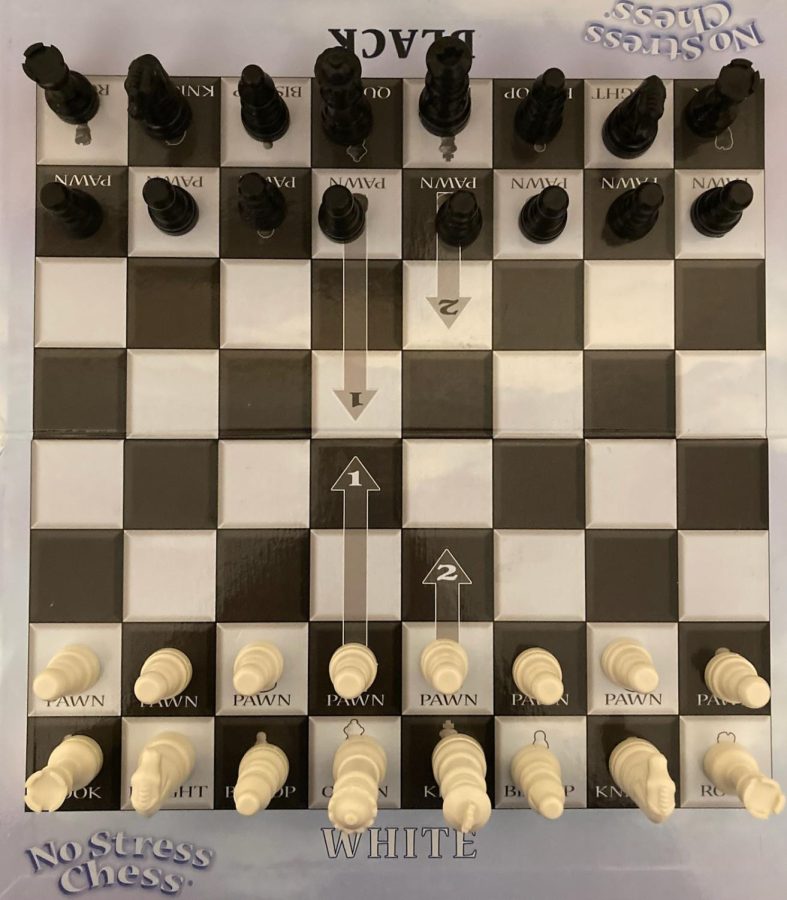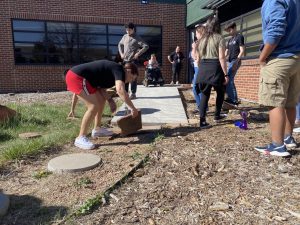Creek Student Becomes Chess National Master
A No Stress Chess game board from game maker Winning Moves shows the different moves a player can make. The game board is one of many ways new chess players can learn the game. New chess players can also learn and play online on sites like chess.com. “For online chess, I would say that it has been really great to see how a lot of people who were not particularly interested in chess a few years ago are now interested in it, so that’s really cool to see,” Bhavikatti said. “Hopefully with this online kind of chess wave we can see more people playing on sites and getting more involved in the game.”
May 19, 2022
In recent years, chess has gained more and more popularity due to more recognition from game makers, online streaming sites like Twitch, and shows such as “The Queen’s Gambit.” Because of this, the number of people playing chess has increased. For instance, according to Business Insider, more than 100,000 new members registered to play on chess.com each day about four weeks after “The Queen’s Gambit” was released.
While there are many newcomers to chess largely because of more recognition, Creek sophomore Neil Bhavikatti recently became a chess National Master after playing chess since he was 5 years old.
The title of National Master is obtained after a player has a U.S. Chess Federation (USCF) rating of over 2,200 points. After competing in a USCF tournament, points are given based on the player’s performance compared to others’ performances. If a player beats a higher ranking player, they earn more points than they would if they had won against a lower ranking player or a player of the same rank. Likewise, if a player loses against a player that is lower than them, they will lose more points. Bhavikatti recently played a tournament and was able to get to 2,206 points.
“I’ve been playing chess since I was five,” Bhavikatti said. “It definitely meant a lot to be able to get this and it is a title you have for life [and] it’s definitely great to get over 2200 [points].”
The title is also a huge honor according to fellow National Master and 1981 Creek graduate Todd Bardwick.
“Becoming a National Master is a huge accomplishment that means a lot since it is a lifetime goal of many chess players and represents achieving roughly the 99th percentile of tournament players,” said Bardwick via email. “Neil is the first CCHS student to become a master, probably since me – [which was] a long time ago. We had about five masters from Creek the ten years before me.”
Bhavikatti first got interested in chess after his cousin, Nithin Kavi, who is also a chess National Master, started playing, and Bhavikatti’s parents told him that he could achieve the kind of success Kavi had experienced if he tried chess. Kavi played his first tournament when he was seven, and has given Bhavikatti advice since then.
“In the beginning when he was much more new to the game and I was much more experienced, I would advise him to just do tactical training online, to go to his coach to ask him questions, and to ask me questions as I was much stronger at the time,” Kavi said. “He got better, and I started recommending different books to him, and I recommended him to look at professional games and see how grandmasters play.”
At first Bhavikatti only played against his dad for the first few months when he got started but then started playing tournaments. Despite not doing well in his first few tournaments, Bhavikatti kept playing and has had continuous support from those around him including his family and coaches.
Playing chess leads to ups and downs and highs and lows, and when going through low points Bhavikatti’s competitive personality and passion about chess helps him get through them.
“Sometimes you get on these streaks where you do really well [and where] multiple tournaments in a row you’re very successful [and] winning a lot of games against players that are much highly rated than you,” Bhavikatti said. “Sometimes you have bad stretches where you might lose against people who are lower than you; I always just try to take it as a learning experience. [I] try not to get too low during those times [and] try not to get too high when I’m doing well.”
While chess involves many different mentalities and strategies, Bhavikatti believes that starting chess first requires determination.
“I definitely remember when I was five or six I did very poorly in many of the first tournaments I played, but just stick with it, and at some point you’re going to see a definitely a big increase in your rating and in your confidence which will help you to keep playing [and] keep your motivation,” Bhavikatti said.






















